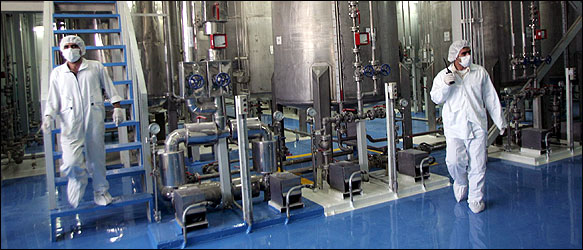
ISTANBUL—Iran has pledged to stop enriching uranium to the higher grade needed for a medical research reactor if world powers agree to a fuel-swap deal it outlined earlier this year with Turkey and Brazil, Turkish Foreign Minister Ahmet Davutoglu said Wednesday.
The offer marks the latest in an international tug-of-war over the nuclear ambitions of Iran, which denies international allegations that it is pursuing nuclear weaponry. U.S. and European diplomats say Iran’s offer suggests it has felt the pinch of a rash of economic sanctions imposed on Tehran since June.
The United Nations imposed sanctions in part because Iran insisted it would continue enriching nuclear fuel to 20%, a level Tehran said was necessary to fuel a medical-research reactor and that the U.S. and others feared was a step toward creating nuclear weapons.
Mr. Davutoglu said Iranian foreign minister Manouchehr Mottaki offered to change Tehran’s position on continuing enrichment when the two men met in Istanbul on Sunday. Mr. Mottaki had said “there will be no need for Iran to continue 20% enrichment if the Tehran Agreement was realized and the country gets the fuel it needs,” Mr. Davutoglu told a joint press conference with German Foreign Minister Guido Westerwelle on Wednesday.
A spokesman for Iran’s foreign ministry could not be reached for comment.
U.S. officials Wednesday said they were studying Iran’s recent discussions with Turkey as well as a letter sent by Tehran to the United Nation’s nuclear watchdog, the International Atomic Energy Agency, on Monday.
Iran has communicated to the IAEA and the European Union’s foreign policy chief, Catherine Ashton, a desire to meet with the international community on the nuclear issue in September, following the Islamic holy month of Ramadan, according to a U.N. official. The Obama administration has been seeking to negotiate with Iran through the five permanent member of the U.N. Security Council, plus Germany.
“We have clearly indicated that we are prepared to engage Iran along with the rest of the P5+1 regarding the international community’s concerns about Iran’s nuclear program,” said a senior U.S. official Wednesday. “There are contacts under way with Catherine Ashton regarding a possible meeting.”
U.S. and European officials have said in recent days that they are skeptical about Iran’s recent overtures, given Tehran’s history of making agreements with the international community only to back out in succeeding months. They also said Iran would need to significantly sweeten the fuel-swap arrangement offered to Turkey and Brazil in May to generate interest in Washington and European capitals.
Still, U.S. and European diplomats said they believe the rash of new economic sanctions imposed on Tehran over the past two months has rattled the Iranian leadership. They said they’ve heard from Iranian officials, through interlocutors, that the financial penalties recently imposed by the European Union this week were much more expansive than Tehran anticipated. They said that there are already signs that the combination of new U.N., EU and U.S. sanctions are starting to have an impact on the Iranian economy.
More than a dozen Iranian cargo ships have been stuck in Iranian ports in recent weeks, according to a European official, due to their difficulties in obtaining insurance. European air-traffic controllers have also grounded Iranian airliners in recent weeks due to their failure to meet safety regulations.
“We’ve been getting more messages than usual that they’d like to get involved in talks,” said the European official in Iran. “For the Iranians to be serious, they’d need to agree to stop enriching to 20% and display a willingness to discuss their nuclear program in its entirety.”
A unit of Iran’s powerful Islamic Revolutionary Guard Corps said last week it was backing out of its involvement in a large, natural-gas project. The guard corps cited the fresh international sanctions, though didn’t give specific reasons for pulling back.
Top Iranian officials in recent days have publicly dismissed the sanctions, saying they will be ineffective. President Mahmoud Ahmadinejad, visiting the site of two petrochemical complexes in the south of Iran on Wednesday, said foreign powers were only hurting themselves by limiting trade with Iran and couldn’t stop Tehran’s ambitions.
“By imposing sanctions they (can) not block the way of Iranian nation,” Iran’s national broadcaster reported.
A spokesman for Turkey’s Mr. Davutoglu said it was too early to say at whether or at what point Turkey would expect the latest rounds of sanctions to be dropped should a deal now be struck on a fuel swap.
Iran has insisted, ever since its secret enrichment program was exposed in 2002, that it is purely for civilian purposes. The international community, led at first by France, Germany and the United Kingdom, has been negotiating for just under seven years to persuade Tehran to suspend all enrichment activities and to buy nuclear fuel instead. So far, they have had little success.
When Tehran said last year it needed to replace expired fuel rods in a medical research reactor, the P5+1 offered to take Iran’s entire known stock of 1,200 kilograms of low enriched uranium, and in exchange to give it processed fuel rods. Iran declined until May, when it agreed in negotiations with Turkey and Brazil to a similar deal.
By then, however, Iran’s stockpile of low enriched uranium had grown much larger and Tehran said it would continue enriching fuel to 20%. Turkey and Brazil voted against the June United Nations Security Council sanctions, arguing they needed to keep Iran at the table for the uranium swap deal.
Uranium can be enriched to produce fuel for power plants at a grade of around 3%. It can also be enriched further, to around 85%, for weapons-grade fuel. Western governments fear Tehran wants the capability to enrich its own fuel to build a bomb, a charge Tehran denies. Enriching to 20% could help Iran to refine the technology needed to enrich fuel further to weapons grade, analysts say.